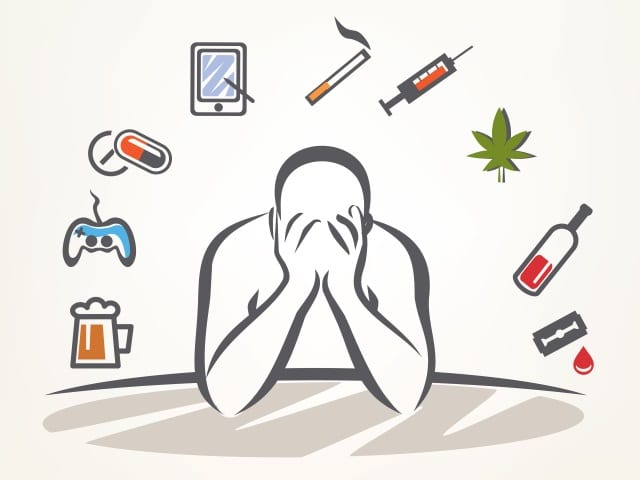
It goes against every instinct I have to write this article. I never would have written it even five years ago. I’m basically a private person who doesn’t easily share my inner-most thoughts, especially not my darker aspects. That private nature actually played a significant role in what got me into the mess I’m about to share. I’ve begun to open up since I started my blogging career. I’ve become much more willing to share my opinions and have been quite open with them. But I still tend to keep my personal issues pretty bottled up. Lately, they’ve been coming out in the lyrics to the songs I write, but those are usually in a much more ambiguous form. I’m not really sure why I’m writing this now. I can only tell you that lately, there has been a nagging voice in my head that keeps telling me that someone out there needs to read my story. If I’m going to call myself a writer–if I want my words to have any real impact–I have to be honest and vulnerable. So, I’m going to swallow hard and dive in. Here goes nothing…
I’m at war with my addictive personality. I’m always battling with some sort of addiction. Most of them are relatively benign, social media, golf, buying things I don’t need, etc. Even writing has become a bit of an addiction. That’s not necessarily a harmful addiction except when it causes me not to be fully present for others much of the time. I often live deep inside my own head. That’s where my writing happens. Sitting down at my computer is only the delivery system for the words to flow through my fingertips. The actual writing takes place hours–or sometimes days and weeks–prior to the physical manifestation of words on a screen. If I don’t create some form of new writing every day–poetry, lyrics, blog pieces, columns for newspapers, etc.–I begin to feel like a failure. While that writing addiction may be on some level unhealthy, I think I’m going to hold onto that one, at least some good comes of it, either for me or, hopefully, for some readers. But on occasion, I’ve battled much more harmful and potentially deadly addictions.
They are the demons that I’ve worked diligently to keep hidden until now.
Before I get into the specifics, I need to set the backstory of what brought me to the mental state which opened the door to the addiction itself. I’m 52 now and I wasted much of the first half of those years. I have no traumatic childhood stories on which to blame that. I was raised in a stable, progressive Christian, middle class home. My parents were–and still are–pillars of their small town community. There was never any serious arguing or tension between my parents. There was never even any alcohol consumed among my parents or their immediate circle of friends. I had to work–or, perhaps more accurately, not work–to eventually find my addiction. When I was in elementary school, I overheard my principal telling my parents that a student with my aptitude test results should never have to struggle to make anything but A’s in any class. Some people might have heard that and been inspired to make the most of their potential. I heard it and used it as justification that I didn’t have to work very hard. That attitude slowly but steadily caught up with me. I never developed the good habits needed to excel in school. I got by on my ability alone, never on hard work. Consequently, B’s, C’s, and D’s far outnumbered A’s on my high school report cards. I had the potential to graduate near the top of my class but settled for being somewhere far down in the middle. But that didn’t bother me much–at least not enough–at that time. I was still going off to college and I was talented enough in basketball to play at that level. I was good to go, in my mind. I just knew I could flip the switch anytime I needed to and get by in college, too. Turns out I was wrong about that.
But there was one thing I did not fall victim to in high school. I never gave into the peer pressure to drink alcohol. I knew well that most of my friends were going to parties and drinking pretty regularly by the time we were juniors and seniors. I never did, not once. I still hung out with my friends, but I didn’t follow them when they were going out and drinking. Once high school was over and I had some independence in college, that was about to change, big time.
College started out ok. It helped that basketball workouts started before school did and continued through the first semester. That was the motivation I needed to go to most of my classes and keep my grades up enough to pass my courses. But there were changes happening deep in the darker corners of my mind. I had not declared a major yet. I didn’t know what to do. I knew I wanted to be a writer, but I had no idea what path to take to make that happen. And, truth be told, I was frightened to pursue it for fear of failure. So I languished on doldrum seas without a sail or rudder. That uncertainty began to weigh on me and the first seeds of depression were planted.
Now, I’m about to reveal to you a part of my story that only a handful of people–less than 5–know about. The way that my young mind chose to handle this turned out to be the worst turning point in my life. At this time, I began discovering several lumps in different parts of my body. They weren’t visible, but I could feel them under my skin. As stupid as this sounds, the hypochondriac in me became convinced that I was ravaged with cancer. And the really dumb part is that I didn’t tell anyone about it. To this day, I can’t explain why. So, at age 18, I became convinced that I wasn’t long for this world. The tragic part of this story is that if I had just told my parents about this, I would have learned that benign lipomas run in my family. I would have known those little lumps were just a harmless genetic anomaly. But keeping my “dark secret” planted more seeds of depression and before long, I decided to put my teetotaling days behind me. For the rest of the school year, alcohol was a regular part of my diet. And, since I was “dying” anyway, going to classes seemed pointless. Needless to say, I finished my first year of college with only 15 credit hours. So, I dropped out and began to carry the stigma of failure with me. More seeds of depression took root.
Back in my hometown, living with my parents into my early 20s, I felt like a bonafide loser. I worked dead end jobs and drank. Not only did I drink, but drinking and driving became a frequent past time. I’ll spare you the details but that didn’t end well either. Thank God I never hurt anyone in my stupidity. Eventually, I had enough of carrying the albatross of failure around in my hometown, so I decided to move out to Los Angeles with some friends. The prospect of becoming a writer was rekindled and the idea of doing it in L.A. was enticing. L.A. turned out to be a 9 month party. I was still too frightened of failing at my writing dream to even give it an honest effort. The next best thing for me was to get a job in a bookstore where I was at least surrounded by good writing. But mostly what I did in L.A. was build up a huge tolerance for beer and solidify my growing addiction. I also experimented with some drug use out there but, thank God, I never got too far into that and didn’t really like it enough for it to ever become an addiction. I had picked my poison and alcohol it was. It took me less than a year to fail in L.A. and I could no longer afford to live there. So back to Indiana I trudged, beaten down, more depression seeds sown.
I moved to Indianapolis upon my return and I have lived here ever since. The first several years of life in Indianapolis did nothing to rid me of depression and nothing but increase my drinking. I had reached the point where I was drinking a 12 pack of beer every weeknight and a good deal more than that on weekends. Drinking was nothing more than self-medication at this point. I was wondering why I was still alive, my “cancer” should have taken me by then. I was feeling more a loser than ever and I wanted to kill the pain by drowning it in beer and liquor. By this time, whiskey and vodka were becoming more frequent choices. This went on for years. I was working jobs I hated and walking around in a drunken stupor more often than not. I was able to function well enough to keep a job and maintain the facade of someone who was fairly normal. Most of the people who knew me best had no idea I was going through this hell. I kept up a decent act for a long time.
The only good part of this period of my life was that I met my wife. Dating her gave me something to live for and a reason not to get drunk all the time. Oh, I still got drunk, just not all the time. I was 26 when we got married. I don’t think she had any idea how much I drank–if she had, I doubt she’d have agreed to my proposal. Now I had a reason to get my life together, but the addiction had other plans. My wife and I would drink socially, but social drinking was never my problem. My problem was that I drank most heavily when I was alone. I didn’t like myself, so I drank nearly every time I was alone so that I could feel less. Some people become addicts to feel something, I became an addict to avoid feeling something. So, this began a dark period, early in my marriage, where I was a casual social drinker in front of my wife and a closet drunk behind her back. At this stage of our marriage, I was working an awful job on 3rd shift. That gave me lots of opportunity to drink when my wife was at work during the day. I also drank in the wee hours of the morning during my breaks and lunch breaks at work. Eventually, of course, she began to catch on to me. I’d lie, make excuses, deny, whatever it took. I’d try to lay off the booze after I’d been caught, but it never lasted long. Eventually, she began to find vodka bottles in places I’d hidden them around the house, one time, ironically, in a cookie jar, as I recall. This era eventually led to me hitting rock bottom. I had put my marriage at risk by damaging my wife’s trust in me. I understood I needed to change. So, I went back to the roots of my upbringing. I sought the counseling of a pastor and was baptized. That was 20 years ago. It took a good long time and a lot of work to begin to build back up some of the my wife’s trust in me but, thank God, she continued to stand by me through it all. We will celebrate 26 years of marriage in February.
I wrote this song expressing my sorrow and appreciation for my wife in those early years of our marriage.
I quit drinking at rock bottom. I have battled other addictions since then, but the demon of alcohol has been exorcized from my life, God willing, for good. My “cancer” never materialized, but my lipomas are still there and they remind me of my foolishness every time I feel them. Once I stopped drinking, good things began to happen to me. I went back to college and got my degree in education, followed by a masters degree. After teaching for several years, my dream of being a writer came back to me and was actually realized. I wrote a historical novel which was published by the Indiana Historical Society in 2015. That book, The Carter Journals: Time Travels in Early U.S. History, is used in several schools as supplemental curriculum and it opened the door for me to meet some of my writing idols and feel a small part of the writing community. It also led me to become a political columnist for Patheos and an education columnist for several newspapers across Indiana. While I still battle with depression, I do feel much better about myself. I have found the right medication to stabilize my darker moods and life is good.
I hope someone out there reads this and understands that you are not alone. Chances are, someone in your life–perhaps several people–who you think has it together is battling the same kinds of demons you are. If you are out there, I wrote this for you. You can overcome your addiction. You just need to understand that the addiction is just a symptom of other problems. Once you begin to face those problems, the addiction can be defeated. Until then, just know that I, and millions of others out there, understand what you are going through.
I’ll close with this song I wrote about what an addict goes through on a daily basis.











